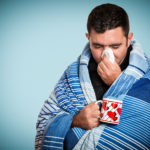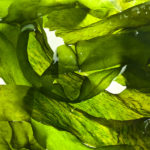By David Blyweiss, M.D., Advanced Natural Wellness
December 23, 2011
In This Issue:
- The advance prep that makes for a better morning after
- Why everyday liver support trumps the occasional overindulgence
- What NOT to take for a hangover
8 Ways To Stop A Hangover Before It Starts
If it seems like you have less tolerance for alcohol as you get older, it’s not your imagination. Even the healthiest among us would have a hard time keeping up at a college frat party. Fortunately, wisdom also comes with age…so we’re less inclined to want to!
Open your arteries, improve blood flow for a new health miracle...
Did you know your circulatory system has over 60,000 miles of arteries, veins and other blood vessels, if stretched end to end?
But as you age, your blood vessels undergo changes, which may cause them to stiffen, thicken and get clogged.
GOOD NEWS! Doctors have now identified a “Miracle Molecule” inside your arteries that helps OPEN your arteries and IMPROVE blood flow.
It’s what Dr. Valentin Fuster calls it, "One of the most important discoveries in the history of cardiovascular medicine."To you, that means...
- Healthy blood pressure
- Sharper mind and memory
- Skyrocketing energy and muscular strength
- Increased pleasure and passion in the bedroom
- Improved circulation to every cell and organ in your body
Go here to discover a new natural way to significantly boost the levels of this miracle molecule in YOUR body NOW!
But that doesn’t mean we never want to have a drink or two more than usual…especially around the holidays or on a special occasion.
Following these few steps of caution – before, during and after a little overindulgence – will radically improve how you feel the next day.
Here’s your natural hangover checklist…
Are You Suffering From...
- Love handles and a pot belly
- Romance that isn't what it used to
- Forgetfulness and inattention
- Low (or no) strength and endurance
- A sex drive that's shifted into neutral...or worse
If so...you may have Mature Male Burnout. Click here to discover more about this unique condition and what you can do about it.
Of course, a healthy liver is the best weapon we have against a nasty hangover. So my first, and most important, recommendation is to support your liver all the time – making sure you get enough vitamins A, C, B-complex, and E, and the minerals zinc, calcium and selenium – so it’s in top shape when you give it a little extra challenge.
While I’m all for having a good time, if you know your liver is compromised, your overall health would be better served by finding a non-alcoholic way to celebrate.
First, it helps if you insert an entire glass of water between every 2 drinks you have. You won’t feel 100% until your hydration level is back to normal, your liver has eliminated all the alcohol, and you’ve gotten enough rest to fully recover. Drinking before, during and after is the minimum you’ll want to do.
That said, here are a few little “extras” that will go a long way to improving your mood the next day:
- Vitamin B: The complex of B vitamins (folic acid, biotin, niacin, thiamine, riboflavin, pantothenic acid, pyridoxine, and cyanocobalamin) is essential for hangover prevention since they are the workhorse of your body’s metabolic system. Be sure to take extra B’s the day before as well as the day after any extra drinking.
- N-Acetyl Cysteine (NAC): This amino acid provides heavy duty liver support, and is a big help in preventing hangovers. Take before bed (600mgm) to help the body recycle and regenerate glutathione.
- Milk Thistle: This flavonoid has strong anti-inflammatory and antioxidant properties, and has been shown in studies to support healthy liver and kidney function. In fact, it has been used by people with cirrhosis of the liver to improve liver function and increase survival rates. Taking 400 to 500 mg. of silymarin, the active constituent in milk thistle, will support your overworked liver by removing toxins and even regenerating injured liver cells.
- Apricot and Avocado: Since alcohol leeches the potassium out of your system, and potassium is responsible for maintaining the body’s hydration, it’s important to load up on high-potassium foods before, during and after you drink alcohol. Most people think banana is the best they can do…but apricots and avocadoes are even higher.
- Honey-on-Toast: Honey contains fructose, an important element in helping break down the alcohol so it can be eliminated from the system. Alcohol turns into acetaldehyde, which is toxic to the body. Fructose converts acetaldehyde to the non-toxic acetic acid, which is then burned during the body’s normal metabolic process. The faster the conversion, the shorter the hangover.
- Avoid Caffeine: You might wake up desperately wanting a cup of coffee…but I recommend you make it decaf. Caffeine is a diuretic, and the last thing your body needs after alcohol is less water.
- Coconut Water: Hydration is key to minimizing and recovering from a hangover. Obviously, you want to drink plenty of water. But coconut water has additional electrolytes that helps you hydrate even faster. Be sure to drink a big glass before you go to bed.
The basic idea behind all of these remedies is helping the body flush out the toxins as quickly as possible. Using this checklist should make it possible for you to have more fun, and suffer less for it the next day.
And in addition to this list of “dos” there is one very big DON’T that you need to remember as well…
What NOT To Do For Your Hangover
You might be tempted to pop a couple Tylenol, drink a glass of water, and go to bed. In a word: DON’T!
Acetaminophen – aka Tylenol – is damaging to the liver. And so is alcohol. Put the two together and, very quickly, you can do an incredible amount of damage to the liver and wind up in the ER in what is sometimes referred to as a Tylenol coma.
Although it’s been widely reported, even in the mainstream press, thousands of people still make this mistake – and some pay the ultimate price. If you want to take an over-the-counter pain reliever for a hangover, ibuprofen is a safer choice. But I urge you to try the 8 remedies I’ve listed above first. I think you’ll be pleasantly surprised.
Resources:
World J Gastroenterol. 2011 May 14;17(18):2288-301. Silybin and the liver: from basic research to clinical practice. Loguercio C, Festi D.
J Am Dent Assoc. 2011 Jan;142(1):38-44. The therapeutic applications of and risks associated with acetaminophen use: a review and update. Guggenheimer J, Moore PA.






